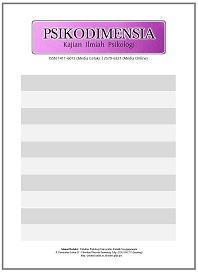Social Cognitive Theory : A Bandura Thought Review published in 1982-2012
Abstract
Keywords
Full Text:
PDFReferences
Bandura, A. (1982). Self-efficacy mechanism in human agency. American Psychologist, 37(2), 122-147.
Bandura, A. (1986). Social foundations of thought and action : A social cognitive theory. Englewood Cliffs : Prentice Hall.
Bandura, A. (1989). Human agency in social cognitive theory. American Psychologist, 44( 9), 1175-1184.
Bandura, A. (1997). Self Efficacy : The exercise of control. New York : Freeman.
Bandura, A. (2001). Social cognitive theory : An agentic perspective. Annual Reviews Psychology, 52, 1-26.
Bandura, A. (2002a). Social cognitive theory in cultural context. Applied Psychology : An International Review, 51(2), 269-290.
Bandura, A. (2002b). Growing primacy of human agency in adaptation and change in the electronic area. European Psychologist, 7(1), 2-16. DOI: 10.1027//1016-9040.7.1.2.
Bandura, A. (2006). Toward a psychology of human agency. Perspectives on Psychological Science, 1(2), 164-180.
Bandura, A. (2009). Exercise of personal collective efficacy in changing societies. Dalam Bandura, A. (editor). Self Efficacy in Changing Societies. New York : Cambridge University Press.
Bandura, A. (2012). Social Cognitif Theory. Dalam Lange. P. A. M. V.; Kruglanski, A.W; & Higgins, E.T. (editor). Handbook of theories of social psychology. Volume 1. London : Sage Publications Ltd.
DOI: https://doi.org/10.24167/psidim.v18i1.1708
Print ISSN : 1411-6073 | online ISSN : 2579-6321 View My Stats

This work is licensed under a Creative Commons Attribution 4.0 International License.




















